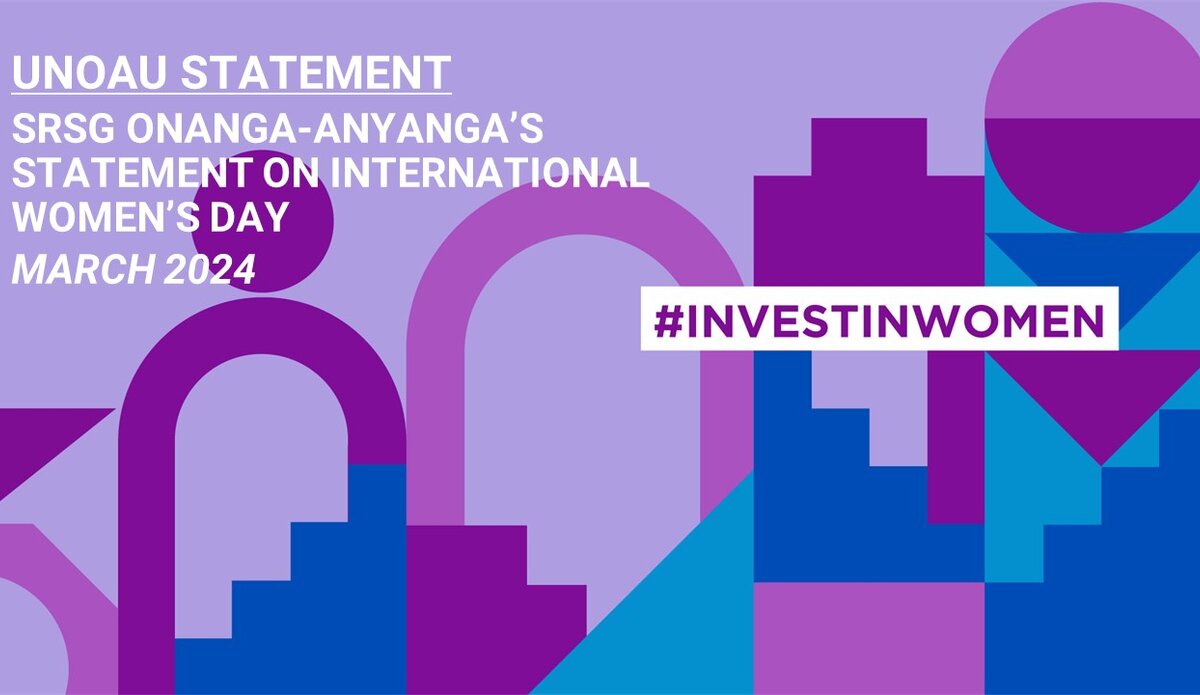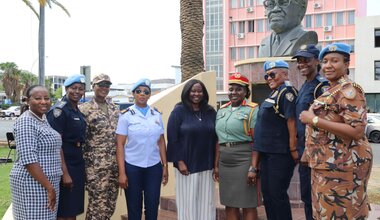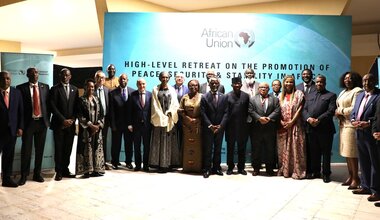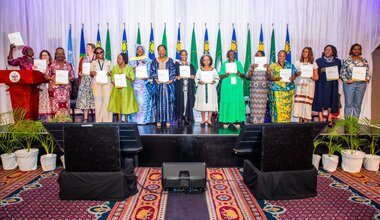International Women's Day | Statement by Parfait Onanga-Anyanga, SRSG to AU and Head of Office UNOAU
United Nations Office to the African Union- Official Statement on International Women's Day – 8th March 2024
Statement by Parfait Onanga-Anyanga, Special Representative of the Secretary-General and Head of Office UNOAU
As we commemorate the international Women's Day 2024, it is a time for celebrating Progress, Renewing Commitment to Gender Equality and Peace in Africa. Investing in Women, Peace, and Security initiatives in Africa has been recognized as crucial for achieving sustainable peace, security, and development on the continent.
This momentous day provides us with an opportunity to reflect on the progress made towards gender equality and women's empowerment, while recognizing the persistent challenges that continue to hinder the full realization of women's rights, particularly in conflict-affected regions.
In Africa, women continue to play a pivotal role in conflict resolution, peacebuilding, and post-conflict reconstruction efforts. Their resilience, courage, and leadership are indispensable in fostering inclusive and sustainable peace. However, women and girls continue to face numerous challenges in exercising their right to meaningfully participate in peace and political processes. Moreover, they remain exposed to conflict related sexual violence.
This year's International Women's Day theme, "Invest in Women: Accelerate Progress”: Touches a crucial part in the work of UNOAU, it means investing in the “Promotion of Gender Equality in Conflict Areas." This underscores the urgent need to amplify the voices of women and girls affected by conflict, to ensure their rights are protected, and their contributions are recognized and valued.
I would like to reaffirm the United Nations' commitment to advancing the Women, Peace, and Security agenda in Africa, in partnership with the African Union and in line with the UN-AU Joint Framework for Enhanced Partnership in Peace and Security”. We must redouble our efforts to implement the commitments outlined in the Security Council Resolution 1325 and nine subsequent resolutions, promote women's meaningful participation in all aspects of political life, peace and security, and protect women and girls against Conflict Related Sexual Violence.
To achieve this, we call on governments, regional organizations, civil society, and the private sector to invest in initiatives aimed at:
Promoting Women's Leadership: Promote and support women's leadership at all levels of society, including in political, economic, and community leadership roles. This can be achieved through affirmative action measures, mentoring programs and advocacy for women's representation in decision-making positions.
Data Collection and Research: Financing the collection of gender disaggregated data to better understand the specific needs, priorities, and challenges facing women in conflict-affected contexts is of crucial importance.
Addressing Structural Barriers: Funding should be availed for addressing structural barriers that limit women's access to resources, opportunities, and decision-making power. This includes addressing patriarchal norms, discriminatory practices, and socio-economic inequalities that perpetuate gender inequality and hinder women's participation in peacebuilding and development.
Increasing Participation of Women in Peace Processes: Efforts to include women in peace processes will lead to greater representation and participation of women at various levels of decision-making, including peace negotiations, peacebuilding efforts, and post-conflict reconstruction. For example, studies conducted by various institutions show that only 6% of peace agreements contain at least one provision that specifically address violence against women and only 20% contain references to women, girls, and gender. There is need for special financial allocation to support women in their efforts to influence peace processes.
Legal and Policy Reforms: Many African countries have put in place legal and policy reforms aimed at promoting gender equality, protecting women's rights, and addressing issues such as gender-based violence and discrimination. To date, thirty-five (35) National Action Plans (NAPs) and six (6) Regional Action Plans (RAPs) on UNSCR 1325 have been adopted by African Member States and regional groups, respectively. There is a need to urgently provide resource for their implementation.
Empowerment and Capacity Building initiatives: Investments in women's empowerment and capacity building will enable women to take on leadership roles in peacebuilding and conflict resolution initiatives. This includes providing training, education, and resources to women, as well as creating opportunities for their meaningful participation in decision-making processes.
Prevention and Response to Gender-Based Violence: There is need to increase funding for initiatives aimed at preventing and responding to gender-based violence in conflict and post-conflict settings. Evidence suggests that unless we end violence against women and girls (VAWG) globally, we won’t achieve at least 14 of the 17 Sustainable Development Goals (SDGs).
Integration of Gender Perspectives into Peace and Security Efforts: Efforts aimed at integrating gender perspectives into peace and security policies, programs, and operations are currently underfunded. This includes resources for meeting the specific needs and priorities of women and girls in conflict prevention, peacekeeping, and humanitarian response efforts. For example, women’s participation increases the probability of a peace agreement lasting at least two years by 20 percent and a peace agreement lasting fifteen years by 35 percent.
Invest in Partnerships and Collaboration: Fostering partnerships and collaboration between governments, civil society organizations, international agencies, and the private sector to leverage resources and expertise for investing in women is crucial. This includes supporting collaborative initiatives that address the root causes of gender inequality and promote women's empowerment.
Overall, investing in women, peace, and security in Africa is our greatest and most underused path to accelerate the full achievement of the Sustainable Development Goals and indeed sustainable peace. We will only achieve sustainable peace and security if every woman and every girl, everywhere, can live a life of dignity and security, free from fear, want and violence.
End of Statement
 UN
UN






